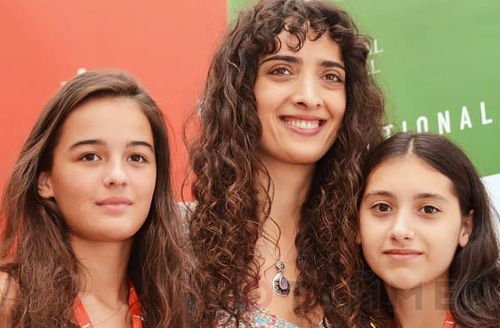Story of a film debut
Nana EKVTIMISHVILI: Cinema has to speak the bitter truth
Created by Georgian film director Nana Ekvtimishvili in collaboration with Simon Gross, In Bloom depicts momentous events of the 1990s in Georgia as the background for the story of two adolescent girls whose childhood is abruptly ending. The film has already won numerous awards, including the Forum Section Award at the Berlinale, FIPRESCI and Golden Firebird prizes at the Hong Kong International Film Festival, Grand Prix at the VOICES Festival in Vologda and the Best Actress Prize at the Odesa International Film Festival. Across the world, audiences meet this sad story of growing up with interest and compassion.
Nana, you belong to that younger generation of Georgian filmmakers who needed to recreate the art almost from scratch, as the Georgian cinema had several generations totally lost because hardly anyone filmed anything at the time. How have you entered the profession?
“I left Georgia in the late 1990s having no specific plans, I just wanted to get somewhere where I would be able to learn and develop safely. I chose Germany. It occurred to me that my only skill at the time was creative writing in Georgian, and, as I already had a few stories in my portfolio, I translated them into German and went to the screenwriting department of the Film School in Potsdam-Babelsberg. I developed some ideas about this film and began writing the script then, too. Later on, I obtained funding from the German Ministry of Culture, and it motivated me greatly. Then I came back to Georgia, joined the Film Center, and met other people who believed that our film will succeed.”
You met Simon Gross in Germany and began to work together, but while you understand naturally the situation of the film, its characters, and even the Georgian landscape, it all was totally new for your co-director. How did you two find common language and how he perceived and understood it?
“We have known each other for a very long time and collaborated on Gross’s debut, the film he shot in Morocco in 2006. We wrote the script for In Bloom together. I have to say that writing a script together is much harder than shooting a film together, because writing is a very intimate process, while filming requires the ability to communicate with teammates. We have found common language easily and developed a general idea of how it all was to be done.”
Still, a lot has changed in the world over the years that have passed since the 1990s to the present day, and especially so in the world which you left in Georgia. People have gone through losses, war, illusory hope and loss of hope amid unending social and interpersonal change. Do you think that today’s audience accepts the time that your film shows because it was the starting point of a whole new era?
“I think that people are willing now to accept this movie and think about what happened. They did not want to think about it for all these years. Trauma was very fresh, and Georgia was really hurt by its experiences. Even today, they try to banish memories of it. I do not know if I would have made this movie had I stayed in Georgia. Probably not, because my family and my friends here in Georgia were forgetting all that we had experienced then as they had new traumas, new events, new people, and new losses to contend with rather than dwell on the past.”
The politics as such seems to be absent from your film. We all live in society and cannot escape it. However, can and should the artist be involved with politics, does it help or hinder them?
“No creative person exists outside of society. One has to feel one’s society, otherwise it is impossible to create anything. Of course, every society is inherently political. No matter how politicized one is, one has to take a stand. I do not know if this is reflected in the film, but I feel strongly about Georgia and its challenges, internal and external alike.”
Quite a few diverse audiences watched your movie lately in Berlin, Vologda, Ukraine, Hong Kong, etc. Have you noticed any differences in their reactions?
“They have in common their understanding for the film’s characters. Our protagonist evokes compassion in all countries equally. What an audience wants to understand is likely to depend on its temperament and mentality. For example, German audiences tend to seek a comprehensive understanding of the story, while Ukrainian audiences take it differently, because we have such a long common history, so they internalize it. Most importantly, the story of our protagonist finds emotional response from the audience.”
Although you studied in Germany and have lived there for a long time, we still feel that taste of the wonderful Georgian cinema school in your film. Would you tell us who specifically influenced Ekvtimishvili as a director?
“Of course, directors Shengelaia, Iosseliani and all that generation, all Georgian films, even short films of the 1960s, they are very important for me and I have watched everything. Well, the whole world watched it. They did not look at it as art, it was part of their life. This feeling was my primary impetus, perhaps an unconscious one. It all is a part of me, it happened so by itself somehow that the film is probably a continuation of the Georgian tradition that I treasure most – an art that speaks the truth, even it is a bitter one.”






